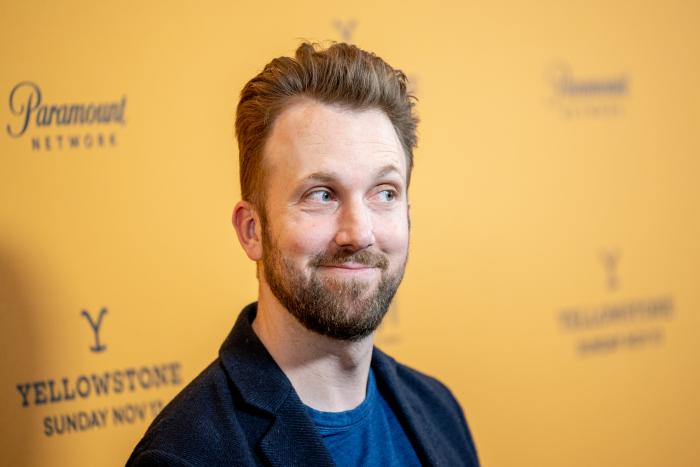

Netflix's 'The Strays' Has Something to Say but No Idea How to Say It
By Petr Navovy | Film | February 28, 2023 |
By Petr Navovy | Film | February 28, 2023 |

To say too much about The Strays would be to ruin it. It’s never really a smart tactic to vest too much power into a twist-or rather, what would in this case be more accurately described as a ‘reveal’— but The Strays doesn’t just feature a reveal as a key part in its story, it rests a huge amount of its dramatic power on a plot point that it doesn’t really do anything with, even while it’s clear that it thinks it’s delivering a knockout.
It’s a shame, really, because The Strays starts strong. First-time writer-director Nathaniel Martello-White creates a strong sense of claustrophobia and potent unease as he shows us a light-skinned biracial woman, who we soon learn is called Cheryl (Ashley Madekwe), alone in a London council estate flat, on the phone to someone. Cheryl is in deep despair. We only hear snatches of the conversation, and can’t really piece together much from that, but it’s clear that something bad has just happened, and she is at breaking point.
We don’t spend much time at all with Cheryl, however, before we’re introduced to Neve. Neve doesn’t live in a London council block. She’s living an entirely distinct life to Cheryl’s, way out in a small town in the countryside, all manicured lawns and cheery (all white) neighbors greeting her from across the all-too-quiet road. One of those postcard-ready settlements where retired war criminals (read: ‘ex-Prime Ministers’) rub shoulders with other members of the classes that make England the toxic, capitalist wasteland that it is. Curiously, though, despite this dramatic shift in location, as well as an entirely different dress sense, manner of speaking, and overall behavior, Neve looks identical to Cheryl.
Whatever sense of paranoia, confusion, and audience immersion The Strays manages to generate with this whiplash opening is then dissipated with alarming speed as the script completely loses its way. Sadly, the more we see, the worse it gets. Momentum is lost, characters prove flat and uninteresting, and the big reveal that the film hinges on is undermined by its own chapter-based structure in which it rewinds time to show us events from someone else’s perspective.
I have to use this phrase again, but it really is a shame, as there are moments here that hint at a better film, though they do not come frequently. There’s a semblance of style glimpsed through the mess, with the camera sometimes moving purposefully and framing scenes effectively in furtherance of atmosphere and mood. The ending comes sharp, unexpected, and if it had been done better—and been the culmination of a stronger film-could have been a memorable one indeed. The cast try their best, but the material simply isn’t there. The disparity is felt most in the presence of Bukal Bakray, who was so phenomenal in 2019’s Rocks, and who has a supporting role here. Every moment she is onscreen you can feel the power of her skill straining against the weakness of the script.
The Strays has an interesting and resonant message at its heart, in theory. It has a lot to say, in theory. Yet after the first few minutes, theory is all that’s left. A hypothetical, an afterimage of a much better version of the film we’ve actually gotten. One which takes the heavy-handed messaging around race, class, and identity that The Strays wants to explore, but which actually does so with some meaning and drama. Perhaps that’s the film that director Martello-White will deliver next time.
The Strays is streaming now on Netflix
← Whatever Happened to Jason Lee from 'My Name Is Earl,' 'Mallrats'? | It Was Never About Cancel Culture: It Was Always About Capitalism →
More Like This
David Dastmalchian's 'Late Night with the Devil' Takes the Late-Night Wars into the Horror Genre
The Stormy Daniels' Doc 'Stormy' Is Big on Attitude but Light on Revelations
The 'Alien: Romulus' Teaser Will Get Your Blood Pumping
A Classic Film That Scarred You As A Child Is Getting A Reboot
Review: 'Damsel' Needs Saving from the Soulless Netflix Formula

Jordan Klepper Got A "Glimmer Of Hope" From A Trump Supporter
Leave Josh Peck Alone, Says Drake Bell in the Wake of 'Quiet on the Set' Revelations
Sophie Turner Has ‘Reactivated’ Her Divorce From Joe Jonas
Is Aaron Taylor-Johnson The Next James Bond?
Sydney Sweeney Is All Business When It Comes to ‘Madame Web’: ‘That Film Was a Building Block’
Megan Fox Helpfully Lists All The Plastic Surgery She's Had
More Like This
David Dastmalchian's 'Late Night with the Devil' Takes the Late-Night Wars into the Horror Genre
The Stormy Daniels' Doc 'Stormy' Is Big on Attitude but Light on Revelations
The 'Alien: Romulus' Teaser Will Get Your Blood Pumping
A Classic Film That Scarred You As A Child Is Getting A Reboot
Review: 'Damsel' Needs Saving from the Soulless Netflix Formula
Reviews